Note: Our accounts contain the personal recollections and opinions of the individual interviewed. The views expressed should not be considered official statements of the U.S. government or the Association for Diplomatic Studies and Training. ADST conducts oral history interviews with retired U.S. diplomats, and uses their accounts to form narratives around specific events or concepts, in order to further the study of American diplomatic history and provide the historical perspective of those directly involved.
The Catholic Church has been a political force in Europe for more than a millennium and more than a fifth of all Americans were either raised or are practicing Catholics. Bilateral ties with the Papal States were established in 1848 but lapsed in 1867, in large part because of increasing anti-Catholic sentiment in the United States.
Re-establishing relations with the Vatican turned out to be a long and often bumpy road, as many Americans, including some Catholics, opposed bilateral ties on the grounds they would somehow undermine Constitutional separation of church and state. The United States and the Holy See finally announced the establishment of diplomatic relations on January 10, 1984 during the Reagan Administration.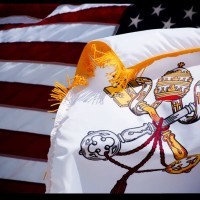 In separate interviews with ADST in 1995 and 1994 respectively, Ambassador to the Holy See Thomas Melady and DCM Peter Murphy describe the history of US-Vatican relations. Read the entire account on ADST.org. This account was edited by C. Bradley.
In separate interviews with ADST in 1995 and 1994 respectively, Ambassador to the Holy See Thomas Melady and DCM Peter Murphy describe the history of US-Vatican relations. Read the entire account on ADST.org. This account was edited by C. Bradley.
MELADY: The United States recognized the Papal States from 1848 to 1867. Up until the unification of Italy, the territory of the Pope actually met the criteria of a sovereign state. They had land, they had a government, they had an army, they had currency.
In 1867 the United States Congress passed the no-funding act. The House of Representative said no more money for a mission accredited to the Pope. After 1867 there was a long interregnum, which coincided with a period of anti-Catholicism in the United States.
FDR was convinced that the Vatican was a great source of information. So President Roosevelt announced on Christmas eve, 1939, after the war had started in Europe, that he was sending a personal envoy who would represent him, not be a government official.
Soon after Myron Taylor, his long-time friend, a leading Episcopal laymen and retired head of U.S. Steel, went off to Rome as the Special Envoy. Whatever goals FDR had for Myron Taylor, it certainly exceeded the goals. It was a gold mine. So significant was the information [Taylor obtained] some of it is still classified [as of 1995].
In 1950 Truman concentrated on the Vatican assignment, and he saw what a gold mine of information came out. Information -- there wasn't much strategy, but information. He, without much consultation, decided that we ought to have an ambassador. So he nominated General Mark Clark in 1951 to be the United States Ambassador to the Vatican...But he didn't do much advance research on it. It was quite apparent it wouldn't get through, and it died in that session of the senate, and Mr. Truman did not resubmit it.
President Nixon reinstituted the Special Envoy, and did what President Truman did, selected a prominent American. He selected Senator and Ambassador Henry Cabot Lodge. 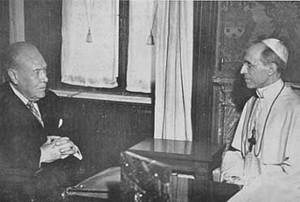 [Then] along came President Reagan. People didn't notice at the time, but President Reagan in the first week or 10 days after his election, announced that his long-time friend William Wilson would be his Special Envoy.
[Then] along came President Reagan. People didn't notice at the time, but President Reagan in the first week or 10 days after his election, announced that his long-time friend William Wilson would be his Special Envoy.
In January 1984, President Reagan announced the nomination of Mr. Wilson as our U.S. Ambassador to the Holy See. And that set in motion the normal procedure.
There were some organizations that were quite strong in opposition. The American United for Separation of Church and State, ACLU (American Civil Liberties Union). Actually the Baptist Association was opposed to it. And some Catholic organizations, not major ones, but several were also opposed.
The confirmation was a landslide, so Mr. Wilson took the oath and went off to Rome as the first Ambassador of the United States to the Holy See.
MURPHY: I recall that [Ambassador] Bill Wilson and I met at the end of July 1984 in Florence to discuss [my new] position (Deputy Chief of Mission) at the Embassy.
The mission at that time consisted of three officers, plus three secretaries, and one Italian security guard. That was the extent of the Mission.
At the beginning of our second day together in the office, Bill said, "Well, Peter, Betty and I are leaving Rome for about a month and a half. We're going to California. So you'll be in charge, of course."
I was absolutely floored. I had no idea where the offices of the Vatican's Secretariat of State were located; I had no identification to get into Vatican City; I had been introduced to no one connected with the Vatican. In effect, I was left to sink or swim.
There was no one I could ask in Washington -- or even at the post - how one proceeds. No one had any experience with official dealings with the Vatican. Thank God for Mirella Giacalone and Wanda DiAngelos, two local Americans who had worked in the office before the mission was raised to the status of an Embassy.
All my friends at Embassy Rome were very kind, of course, [but] they didn't know much about the Vatican. [The U.S. Embassy to the Holy See] is completely independent of our Embassy to Rome.
In fact, there was a detectable undercurrent of animosity directed against our fledgling Embassy emanating from Embassy Rome. This stemmed directly from the rivalry between [Ambassador to Italy] Max Rabb and Bill Wilson but also extended to the Embassy's Political Section where it was felt that the Embassy to the Holy See was unnecessary. I did all I could to unify the two diplomatic missions. I attended Embassy Rome staff meetings from time to time to give an overview of what we were doing at the Vatican. 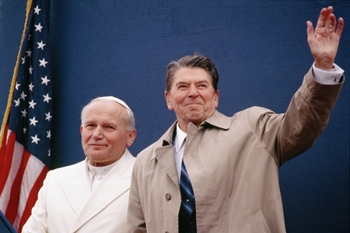 During my four plus years of service at the Vatican, several topics were always out of bounds for discussion between officials of the Vatican and our Embassy. Sometimes the line is quite fine: during the Reagan years, when we at the Embassy were attempting to convince the Vatican on the necessity of somehow coming out with a public statement approving our Strategic Defense Initiative (SDI), we had to be very careful not to appear to be lobbying the Vatican against the Peace Pastoral being written by the American Bishops Conference at the time.
During my four plus years of service at the Vatican, several topics were always out of bounds for discussion between officials of the Vatican and our Embassy. Sometimes the line is quite fine: during the Reagan years, when we at the Embassy were attempting to convince the Vatican on the necessity of somehow coming out with a public statement approving our Strategic Defense Initiative (SDI), we had to be very careful not to appear to be lobbying the Vatican against the Peace Pastoral being written by the American Bishops Conference at the time.
I frequently met American priests, laymen, [and] noted political figures who brought up the subject of the Catholic Church in the United States. I would be obliged to gently redirect the conversation. Why, I recall, at the end of a private audience regarding sensitive political matters, one distinguished American General started telling the Pope about the terrible pastor he had in his parish in the Northern Virginia area. I was aghast...but the Pope took it in stride, telling him not to worry....the priest couldn't last forever.
Another time I recall a Cabinet member asking how I could go about facilitating the issuance of an annulment of her marriage in the Sacred Roman Rota, the Vatican's marriage tribunal. I let this lady know in no uncertain terms that such matters were far from the scope of our mission at the Vatican and that her local bishop back home would be the person to contact in this matter.
I [also] began getting to know my colleagues in the other 120 embassies at the Vatican. Not much on a protocol level had really been done at this new post. I later discovered that Ambassador Wilson had never made a formal call on the Dean of the Diplomatic Corps -- a major faux pas in a place where they are so hung up on protocol.
An example: while I was in Rome, the French Ambassador to the Holy See went on to become the Under Secretary for Political Affairs in Paris and his successor was the former French Foreign Minister. The Colombian Ambassador was formerly President of his country for seven years. Thus we were dealing with diplomats who knew a thing or two; they had many years of service in their nation's diplomatic corps and were very proud of their present postings.
Communications within the Vatican and from the Nunciatures [Papal Embassies] abroad is remarkable. I was always amazed at the detail information regarding complex political situations which was known within the Vatican. Their communications, however, are certainly not as speedy as ours. In fact, on several occasions, in matters involving the life or death in certain countries, I authorized the sending of Vatican communications through our system, resulting in the saving of several lives. To have relied on the Vatican communication system would have resulted in disaster on several occasions. In effect, the Vatican utilizes the local postal system, sending their official classified correspondence in the old-fashioned five-letter groupings and in Latin, to be decoded at the local Nunciature. 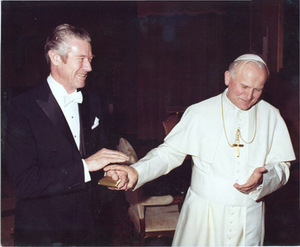 The Vatican has, in addition to its Nunciatures abroad, a great resource which we don't have and which no other secular government I know has. Within the set-up in Rome, there exists various "Congregations" which we could equate to ministries.
The Vatican has, in addition to its Nunciatures abroad, a great resource which we don't have and which no other secular government I know has. Within the set-up in Rome, there exists various "Congregations" which we could equate to ministries.
There is, for example, a Congregation titled "Propaganda Fide," or the "Propagation of the Faith". This large office supervises all the missionary activity of the Church worldwide. Within this Congregation worked some 300 men and women. The Congregation is divided into "country desks" -- similar to our State Department desks -- but Propaganda Fide only concentrates on the Third World, the non-Christian missionary lands. This arm of the Vatican deals simply with the evangelization of undeveloped or non-Christianized lands.
The information gathered by these missionaries who work for and report to Propaganda Fide is absolutely mind-boggling. For a foreign diplomat, it is without a doubt a gold mine of information.
I, for example, would visit the Congregation frequently and discuss local situations - say - with the cleric responsible for affairs in Angola. In a few moments, I would have the latest information on what the missionaries located out in the boondocks of Angola had reported back to the Rome. Such information was invaluable at the time when we had no diplomatic relations with Angola and a civil war was in progress. 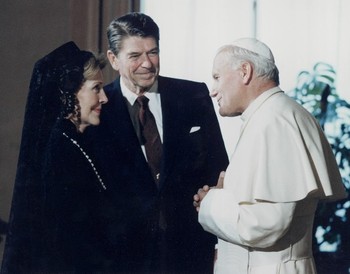 Diplomacy is, of course, not just a one-way street. While we were trying to influence the Holy See, the Holy See was trying to place its stamp on United States policies.
Diplomacy is, of course, not just a one-way street. While we were trying to influence the Holy See, the Holy See was trying to place its stamp on United States policies.
When working with the Holy See on matters involving worldwide political situations, one has the feeling that one is dealing with "diplomacy" at its finest. The Vatican has had many centuries of experience in diplomacy and the Vatican is never in a rush. There always seems to be time to wait, say, for a change of government or a political figure.
